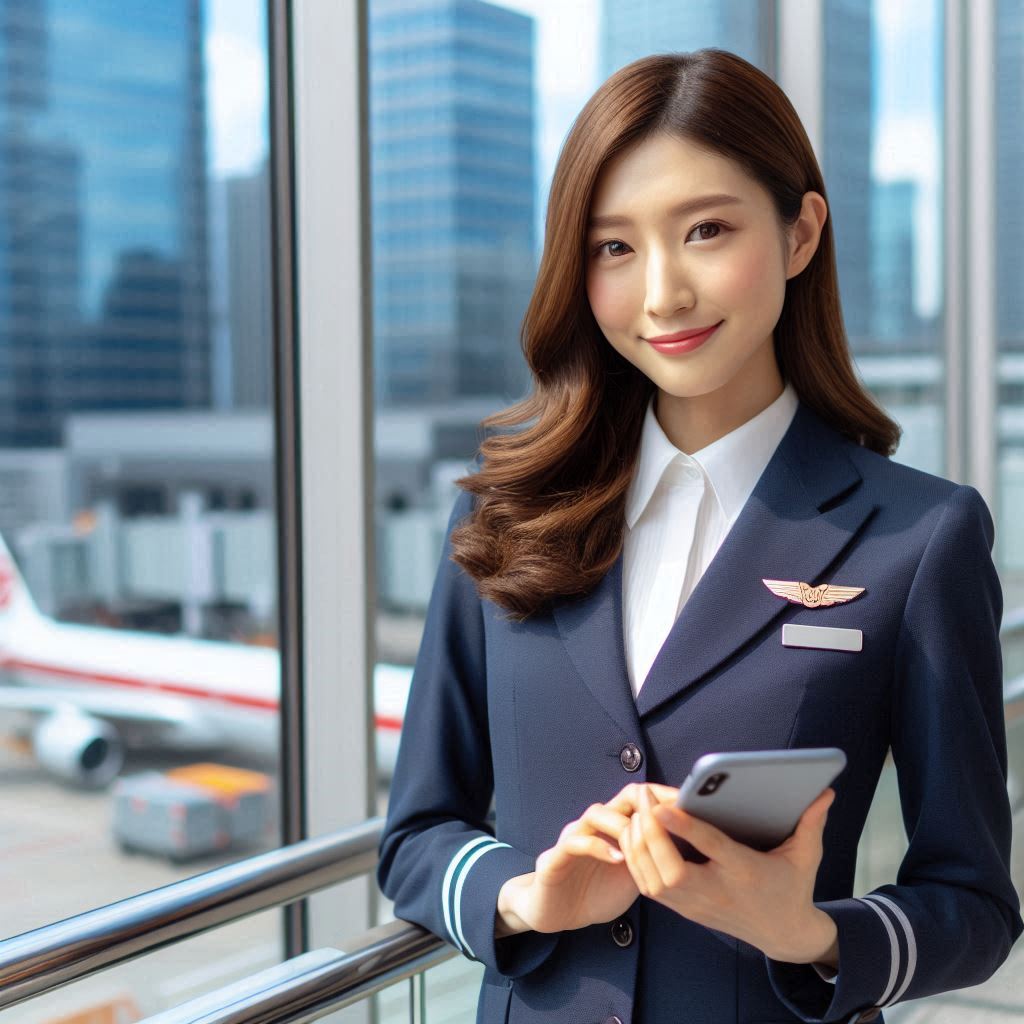Introduction
Flight Attendant Job Requirements and Qualifications
When considering a career as a Flight Attendant, it is crucial to meet the necessary requirements and qualifications.
This ensures that you are equipped to handle the demands of the job.
Importance of Meeting Requirements
Meeting the requirements for a Flight Attendant position is essential for success in the industry.
By doing so, you demonstrate that you have the necessary skills and knowledge to excel in this role.
Competitive Nature of the Industry
The aviation industry is highly competitive, with a large pool of candidates vying for limited positions.
Having the right qualifications can give you a competitive edge and set you apart from other applicants.
Overall, meeting the requirements and qualifications for a Flight Attendant position is crucial for success in the industry.
By ensuring that you have the necessary skills and knowledge, you can position yourself as a strong candidate and increase your chances of landing your dream job.
Education requirements
Minimum Education Level Required to Become a Flight Attendant
To become a flight attendant, you must meet certain educational requirements.
Most airlines require at least a high school diploma or GED.
This foundational education provides the basic skills necessary for the job.
However, many successful candidates pursue additional training to enhance their qualifications.
While a high school diploma is the minimum requirement, many aspiring flight attendants opt for further education.
An associate or bachelor‘s degree in a related field can set you apart from other applicants.
While not mandatory, a degree can provide a competitive edge in the job market.
Employers often look for individuals who can handle stressful situations with professionalism.
Additional Education or Certifications Beneficial for Aspiring Flight Attendants
Certifications can also boost your resume.
Courses in first aid, CPR, and emergency evacuation procedures are highly recommended.
These skills are crucial for ensuring passenger safety during flights.
Many airlines provide their own training programs, but having prior certifications shows initiative.
Degrees in hospitality or customer service can be particularly beneficial.
These programs teach valuable skills in communication, conflict resolution, and customer relations.
Such training prepares candidates for the challenges of working with diverse passengers.
Language skills can be a significant advantage in this career.
Fluency in more than one language opens more opportunities.
Airlines serving international routes especially value bilingual candidates.
Being able to communicate with passengers in their native language enhances the overall travel experience.
Networking is also important in this industry.
Joining organizations related to aviation or customer service can provide valuable connections.
Consider internships or part-time positions in customer service as well.
Experience in the hospitality industry can make a strong impact on your application.
Working in restaurants, hotels, or event planning allows you to develop relevant skills.
These experiences demonstrate your ability to handle customer interactions and solve problems effectively.
In summary, while a high school diploma is the basic requirement, further education can enhance your prospects.
Degrees in hospitality or customer service, along with relevant certifications, can strengthen your application.
Language skills and industry networking also play essential roles in securing a flight attendant position.
By investing in your education and experience, you can significantly improve your chances of landing this exciting career.
Age and Physical Requirements
When considering a career as a Flight Attendant, there are certain age and physical requirements that candidates must adhere to.
These requirements are put in place to ensure that individuals are able to effectively perform the duties of the job and maintain the safety and comfort of passengers onboard.
Age Requirements
- Flight Attendant candidates are typically required to be between 18-21 years old upon application.
- This age range is considered ideal for individuals to handle the responsibilities that come with the role.
- Younger candidates may be more flexible and adaptable to the demands of the job, including irregular hours and long flights.
Physical Requirements
- Height and Weight: Most airlines have specific height requirements for Flight Attendants, usually between 5‘2‘ to 6‘2‘.
- Weight must be proportionate to height to ensure that individuals are physically fit to perform duties such as lifting baggage.
- A higher level of physical fitness is necessary to handle the rigors of the job, including walking long distances and standing for extended periods.
Overall, meeting these age and physical requirements is essential to being considered for a Flight Attendant position.
Candidates must be in good health and physical condition to successfully carry out their responsibilities onboard an aircraft.
Read: Tips for Nail Technicians Working in High-End Salons
Communication and language skills
Importance of Strong Communication Skills for Flight Attendants
Strong communication skills are essential for flight attendants.
They interact with passengers and crew constantly.
Clear communication enhances safety and customer satisfaction.
Flight attendants must convey important information effectively.
They inform passengers about safety procedures and flight details.
Using an active voice helps maintain clarity in messages.
Listening skills are equally crucial.
Flight attendants need to understand passenger requests and concerns.
They must respond appropriately to ensure a positive experience.
Miscommunication can lead to confusion or safety issues.
Therefore, training programs focus on developing these essential skills.
Many airlines prioritize effective communication during their hiring process.
In emergencies, communication becomes even more critical.
Flight attendants must relay instructions quickly and clearly.
They must ensure that all passengers understand safety protocols.
In high-pressure situations, calm and clear communication saves lives.
Airlines train flight attendants to handle these scenarios with confidence.
Training programs often include courses that enhance communication skills.
This helps attendants express themselves better.
Some airlines also focus on conflict resolution and customer service training.
These areas further develop a flight attendant’s ability to communicate effectively.
The Ability to Speak Multiple Languages as a Valuable Asset in This Field, Especially for International Flights
Additionally, being multilingual offers a competitive edge in this industry.
International flights often serve diverse passenger populations.
Speaking multiple languages helps flight attendants connect with passengers from different backgrounds.
It fosters a sense of comfort and trust.
Passengers feel more at ease when they communicate in their native language.
Moreover, multilingual flight attendants can assist passengers more effectively.
They can address questions and concerns without language barriers.
This capability enhances the overall travel experience for passengers.
Airlines recognize the value of this skill and actively seek multilingual candidates.
Fluent language skills also facilitate better teamwork among crew members.
Flight attendants often work in diverse teams.
Strong communication helps them collaborate efficiently.
Effective interaction leads to smoother operations and improved service.
Crew members must share important information during flights.
Clear communication ensures everyone stays informed and aligned.
Training programs often encourage employees to learn new languages.
This investment pays off, benefiting both the attendants and the airline.
Enhanced communication skills lead to better customer service and satisfaction.
In fact, strong communication and language skills are vital for flight attendants.
These skills improve passenger interactions and enhance overall safety.
Multilingual abilities are particularly valuable for international flights.
Airlines prioritize these qualifications during the hiring process.
Therefore, aspiring flight attendants should focus on developing these essential skills to succeed in their careers.
Read: Understanding Pet Grooming Safety Standards
Customer service experience
In order to excel in a Flight Attendant role, having prior customer service experience is crucial for success.
Flight Attendants are responsible for ensuring the safety and comfort of passengers during flights, and excellent customer service skills are essential for fulfilling this role effectively.
Significance of Customer Service Experience
- Ability to handle difficult situations: Customer service experience equips Flight Attendants with the skills to handle challenging passengers or emergency situations with professionalism and composure.
- Communication skills: Effective communication is key in delivering instructions to passengers, providing assistance, and addressing inquiries or concerns onboard.
- Conflict resolution: Experience in customer service prepares individuals to resolve conflicts and diffuse potential conflicts among passengers peacefully.
- Empathy and patience: Flight Attendants must be empathetic towards passengers’ needs and patient in dealing with various personalities and situations while maintaining a positive attitude.
- Adaptability: Customer service experience helps Flight Attendants adapt to changing circumstances and accommodate passengers’ requests efficiently.
Advantages of Related Fields Experience
- Hospitality industry: Individuals with a background in hospitality bring valuable skills in attending to guests’ needs, maintaining a welcoming environment, and ensuring customer satisfaction.
- Retail industry: Experience in retail can be advantageous for Flight Attendants in understanding customer preferences, providing personalized service, and handling transactions or inquiries effectively.
- Food and beverage industry: Knowledge of food and beverage service can be beneficial for Flight Attendants in assisting with meal service, managing inventory, and catering to passengers’ dietary requirements.
- Tourism sector: Understanding the travel industry and destinations visited by passengers can enhance Flight Attendants’ ability to provide relevant information, recommendations, and assistance to travelers.
- Event planning: Experience in event planning equips individuals with organizational skills, attention to detail, and coordination abilities that are valuable in managing in-flight services and ensuring a seamless travel experience for passengers.
Overall, prior customer service experience, especially in related fields such as hospitality, retail, food and beverage, tourism, or event planning.
Significantly benefit aspiring Flight Attendants in developing essential skills and competencies to excel in their roles and provide exceptional service to passengers.
Read: Understanding Nail Disorders: A Technician‘s Guide

Training and certification
Training and certification are essential components in becoming a certified Flight Attendant.
Training Process
- Applicants must complete a training program approved by the Federal Aviation Administration (FAA).
- Training typically takes place at the airline’s designated training facility and lasts for several weeks.
- During training, candidates learn about safety procedures, emergency protocols, customer service techniques, and more.
- Training also includes hands-on practice in simulated scenarios to prepare for real-life situations on board.
Specific Courses and Exams
- Candidates undergo courses on CPR, first aid, aviation security, and other relevant topics.
- Exams are conducted to assess candidates’ knowledge and skills in various areas of flight attendant duties.
- Performance evaluations are also part of the training process to ensure candidates meet the required standards.
Importance of FAA Certification
- Obtaining certification from the FAA is a mandatory requirement to work as a Flight Attendant in the United States.
- FAA certification ensures that Flight Attendants meet the industry standards for safety and security.
- Without FAA certification, individuals are not eligible to perform the duties of a Flight Attendant on commercial flights.
- Employers require proof of FAA certification as part of the hiring process for Flight Attendant positions.
Overall, completing the necessary training and obtaining FAA certification are crucial steps in pursuing a career as a Flight Attendant.
Read: How to Deal with Pet Grooming Allergies
Personality traits and skills
Flight attendants play a crucial role in ensuring passengers‘ safety and comfort.
They must possess specific personality traits and skills to excel in their positions.
Here are the key attributes that define a successful flight attendant.
Transform Your Career Today
Unlock a personalized career strategy that drives real results. Get tailored advice and a roadmap designed just for you.
Start NowDescribing the desirable personality traits and skills that Flight Attendants should possess, such as patience, empathy, and problem-solving abilities
- Patience: Flight attendants often face challenging situations.
Delays, difficult passengers, and unexpected emergencies test their patience.
A calm demeanor helps them manage stress effectively.
This quality fosters a positive atmosphere during flights. - Empathy: Understanding passengers‘ feelings is vital in this role.
Flight attendants should be able to recognize when someone feels anxious or uncomfortable.
A compassionate approach can significantly improve a passenger’s experience.
Empathy helps build trust and rapport, ensuring passengers feel cared for. - Strong Communication Skills: Clear and concise communication is essential.
Flight attendants must relay safety information effectively.
They also need to listen attentively to passengers’ concerns.
Strong communication skills ensure that everyone on board understands instructions and feels heard. - Problem-Solving Abilities: Challenges arise frequently in aviation.
Flight attendants must think quickly and act decisively.
Whether resolving seating issues or addressing medical emergencies, problem-solving skills are crucial.
The ability to find effective solutions enhances safety and passenger satisfaction.
Importance of being adaptable and able to handle stressful situations while remaining professional
- Adaptability: The airline industry is dynamic. Flight attendants must adapt to changing situations and schedules.
Weather delays, last-minute itinerary changes, and passenger demands require flexibility.
Those who can adjust quickly remain effective and maintain service quality. - Resilience: Flight attendants face long hours and demanding conditions. Maintaining professionalism under pressure is vital.
Resilience helps them bounce back from stressful experiences.
A strong mental attitude allows them to provide excellent service, even in challenging circumstances. - Teamwork: Flight attendants work closely with pilots and crew members.
A collaborative spirit is essential for smooth operations.
Teamwork enhances safety and improves the overall flight experience.
Flight attendants who work well with others create a harmonious environment. - Cultural Awareness: Airlines serve diverse populations.
Flight attendants should be sensitive to various cultures and customs.
Understanding cultural differences enhances communication and service.
Awareness of passengers‘ backgrounds fosters inclusivity and respect.
In a nutshell, flight attendants must possess a blend of personality traits and skills.
Patience, empathy, and strong communication create positive experiences.
Problem-solving abilities and adaptability are crucial in stressful situations.
Resilience and teamwork ensure smooth operations.
Cultural awareness enhances passenger interactions.
These traits make flight attendants not just employees but essential service providers in the aviation industry.
Professional appearance and grooming standards
The Dress Code and Grooming Standards that Flight Attendants Are Required to Adhere to While on Duty
Flight attendants play a crucial role in the airline industry.
They are often the first point of contact for passengers.
Therefore, maintaining a professional appearance is essential.
Airlines set strict dress codes and grooming standards for their crew members.
Typically, airlines require flight attendants to wear uniforms.
These uniforms are designed to reflect the airline’s brand.
A well-fitted uniform conveys professionalism and enhances the airline‘s image.
Flight attendants must ensure their uniforms are clean, pressed, and in good condition.
Regular inspections may occur to ensure compliance with these standards.
Grooming standards are equally important.
Flight attendants should maintain neat hairstyles that comply with airline policies.
Long hair should be tied back, and hairstyles must appear polished.
Facial hair must be well-groomed and kept within specified limits.
Airlines often provide guidelines to ensure a consistent look across the crew.
Moreover, flight attendants must wear minimal, conservative makeup.
Bright or overly dramatic makeup can detract from a professional appearance.
Nail polish should also be subtle and maintained.
Airlines expect crew members to present themselves in a way that reflects the company‘s values.
Jewelry should remain minimal and unobtrusive.
Flight attendants should avoid excessive accessories that could distract passengers.
Watches and small earrings are generally acceptable.
However, each airline will have specific guidelines regarding acceptable jewelry.
Significance of Maintaining a Professional Appearance in Order to Represent the Airline and Make a Positive Impression on Passengers
Maintaining a professional appearance is crucial for several reasons.
First, it establishes trust with passengers.
When flight attendants look professional, passengers feel more secure.
A well-groomed crew can enhance the overall travel experience.
Second, a consistent appearance reinforces the airline’s brand identity.
When all crew members adhere to grooming standards, it strengthens brand recognition.
Passengers begin to associate a professional look with quality service.
Lastly, a professional appearance boosts crew morale.
When flight attendants take pride in their appearance, it positively impacts their attitude.
Happy, confident crew members are more likely to provide excellent customer service.
In short, flight attendants must adhere to strict dress codes and grooming standards.
These guidelines are vital in representing the airline effectively.
A polished, professional appearance not only instills confidence in passengers but also enhances the airline‘s reputation.
Ultimately, these standards play a significant role in the success of the airline industry.
Gain More Insights: How to Avoid Common Mistakes When Hiring a Locksmith
Conclusion
Pursuing a flight attendant career demands specific qualifications and requirements.
Aspiring flight attendants must meet educational standards.
A high school diploma or equivalent is essential.
Many airlines prefer candidates with a college degree.
Strong communication skills are vital for success in this role.
Flight attendants interact with diverse passengers and crew members daily.
They must convey information clearly and effectively.
Additionally, they should possess excellent customer service skills.
Providing a positive experience enhances passenger satisfaction and safety.
Physical fitness plays a crucial role in this profession.
Flight attendants need stamina for long hours on their feet.
They must be able to lift heavy luggage and assist passengers as needed.
Meeting health and fitness standards ensures they can perform their duties efficiently.
Multilingual abilities also enhance a flight attendant’s qualifications.
Speaking multiple languages helps communicate with international passengers.
Airlines value candidates who can bridge language gaps.
This skill sets candidates apart in a competitive job market.
Flexibility and adaptability are essential traits for flight attendants.
They must be prepared for irregular schedules and last-minute changes.
Being adaptable helps them manage diverse situations effectively.
This resilience is crucial for maintaining a calm demeanor during emergencies.
Many airlines require candidates to complete specific training programs.
These programs teach essential safety procedures and customer service skills.
Successful completion of training enhances job readiness and professionalism.
It also instills confidence in handling various in-flight situations.
Previous customer service experience is often beneficial.
Candidates with backgrounds in hospitality or retail stand out during the hiring process.
Such experience demonstrates an ability to handle challenging situations with grace.
Meeting these job requirements is vital for aspiring flight attendants.
Understanding the qualifications helps candidates prepare for the application process.
Thorough preparation increases their chances of landing a position in the industry.
[E-Books for Sale]
The Big Book of 500 High-Paying Jobs in America: Unlock Your Earning Potential
$19.99 • 500 High-Paying Jobs • 330 pages
Explore 500 high-paying jobs in America and learn how to boost your career, earn more, and achieve success!
See All 500 High-Paying Jobs of this E-Book
1001 Professions Without a Degree: High-Paying American Jobs You Can Start Now
$19.99 • 1001 Professions Without a Degree • 174 pages
Discover 1001 high-paying jobs without a degree! Unlock career tips, skills, and success strategies for just $19.99!




